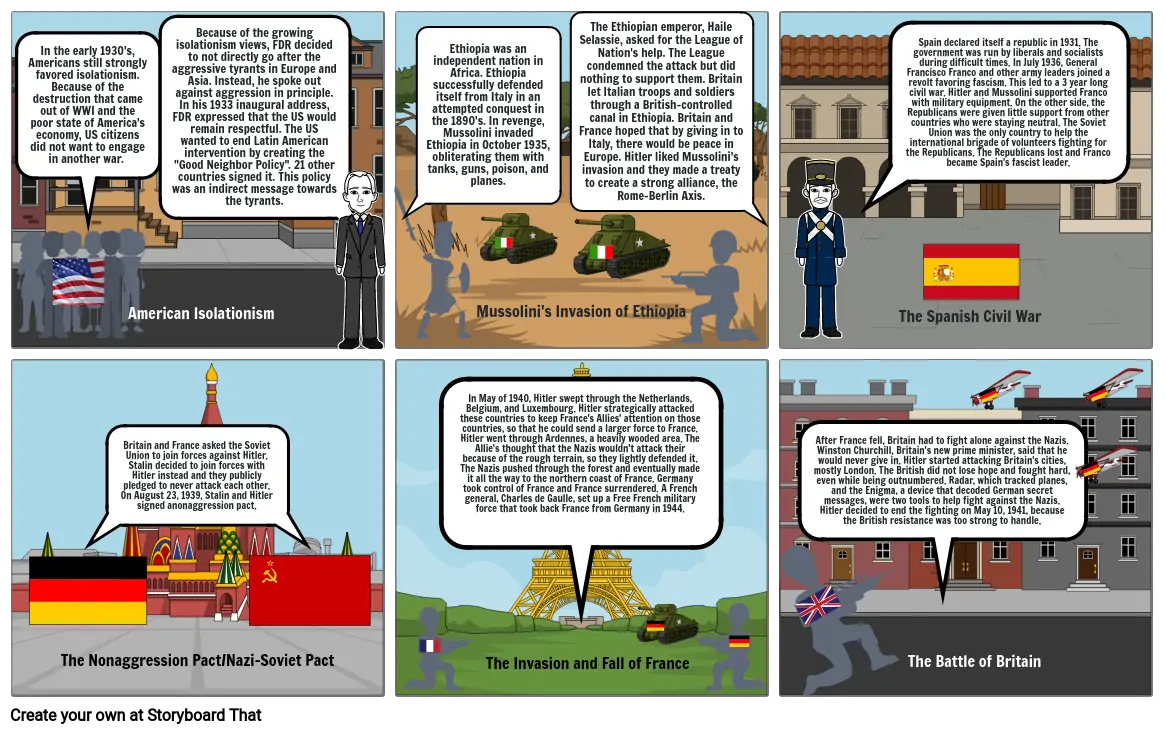US History

Storyboard Text
- In the early 1930's, Americans still strongly favored isolationism. Because of the destruction that came out of WWI and the poor state of America's economy, US citizens did not want to engage in another war.
- American Isolationism
- Because of the growing isolationism views, FDR decided to not directly go after the aggressive tyrants in Europe and Asia. Instead, he spoke out against aggression in principle. In his 1933 inaugural address, FDR expressed that the US would remain respectful. The US wanted to end Latin American intervention by creating the "Good Neighbor Policy". 21 other countries signed it. This policy was an indirect message towards the tyrants.
- Ethiopia was an independent nation in Africa. Ethiopia successfully defended itself from Italy in an attempted conquest in the 1890's. In revenge, Mussolini invaded Ethiopia in October 1935, obliterating them with tanks, guns, poison, and planes.
- Mussolini's Invasion of Ethiopia
- The Ethiopian emperor, Hail.e Selassie, asked for the League of Nation's help. The League condemned the attack but did nothing to support them. Britain let Italian troops and soldiers through a British-controlled canal in Ethiopia. Britain and France hoped that by giving in to Italy, there would be peace in Europe. Hitler liked Mussolini's invasion and they made a treaty to create a strong alliance, the Rome-Berlin Axis.
- The Spanish Civil War
- The Spanish Civil War
- Spain declared itself a republic in 1931. The government was run by liberals and socialists during difficult times. In July 1936, General Francisco Franco and other army leaders joined a revolt favoring fascism. This led to a 3 year long civil war. Hitler and Mussolini supported Franco with military equipment. On the other side, the Republicans were given little support from other countries who were staying neutral. The Soviet Union was the only country to help the international brigade of volunteers fighting for the Republicans. The Republicans lost and Franco became Spain's fascist leader.
- The Nonaggression Pact/Nazi-Soviet Pact
- Britain and France asked the Soviet Union to join forces against Hitler. Stalin decided to join forces with Hitler instead and they publicly pledged to never attack each other. On August 23, 1939, Stalin and Hitler signed a nonaggression pact.
- The Invasion and Fall of France
- In May of 1940, Hitler swept through the Netherlands, Belgium, and Luxembourg. Hitler strategically attacked these countries to keep France's Allies' attention on those countries, so that he could send a larger force to France. Hitler went through Ardennes, a heavily wooded area. The Allie's thought that the Nazis wouldn't attack their because of the rough terrain, so they lightly defended it. The Nazis pushed through the forest and eventually made it all the way to the northern coast of France. Germany took control of France and France surrendered. A French general, Charles de Gaulle, set up a Free French military force that took back France from Germany in 1944.
- After France fell, Britain had to fight alone against the Nazis. Winston Churchill, Britain's new prime minister, said that he would never give in. Hitler started attacking Britain's cities, mostly London. The British did not lose hope and fought hard, even while being outnumbered. Radar, which tracked planes, and the Enigma, a device that decoded German secret messages, were two tools to help fight against the Nazis. Hitler decided to end the fighting on May 10, 1941, because the British resistance was too strong to handle.
- The Battle of Britain
Vytvořeno více než 30 milionů Storyboardů

